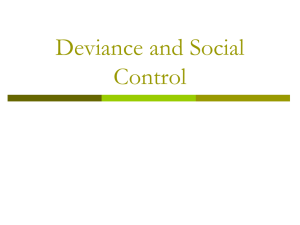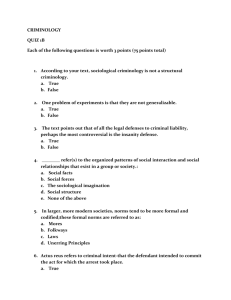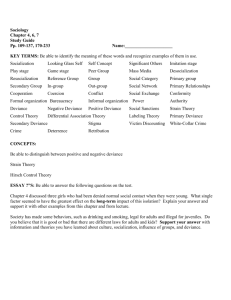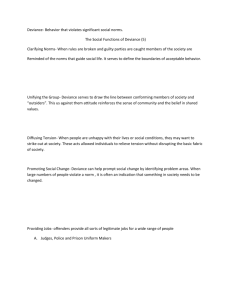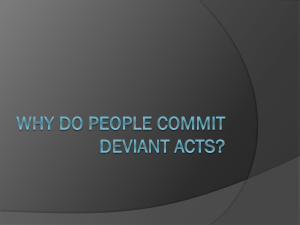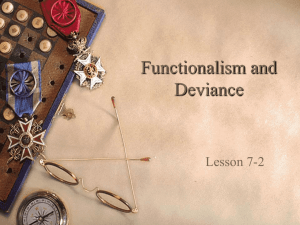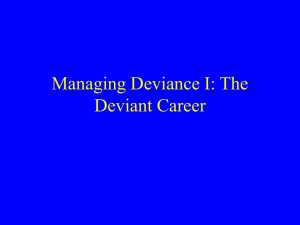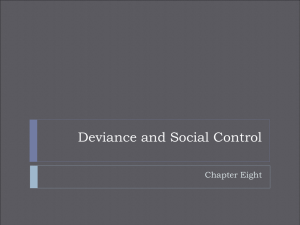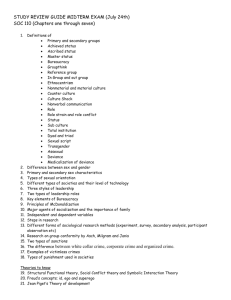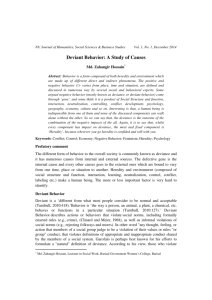The Master List of Sociology Terms
advertisement
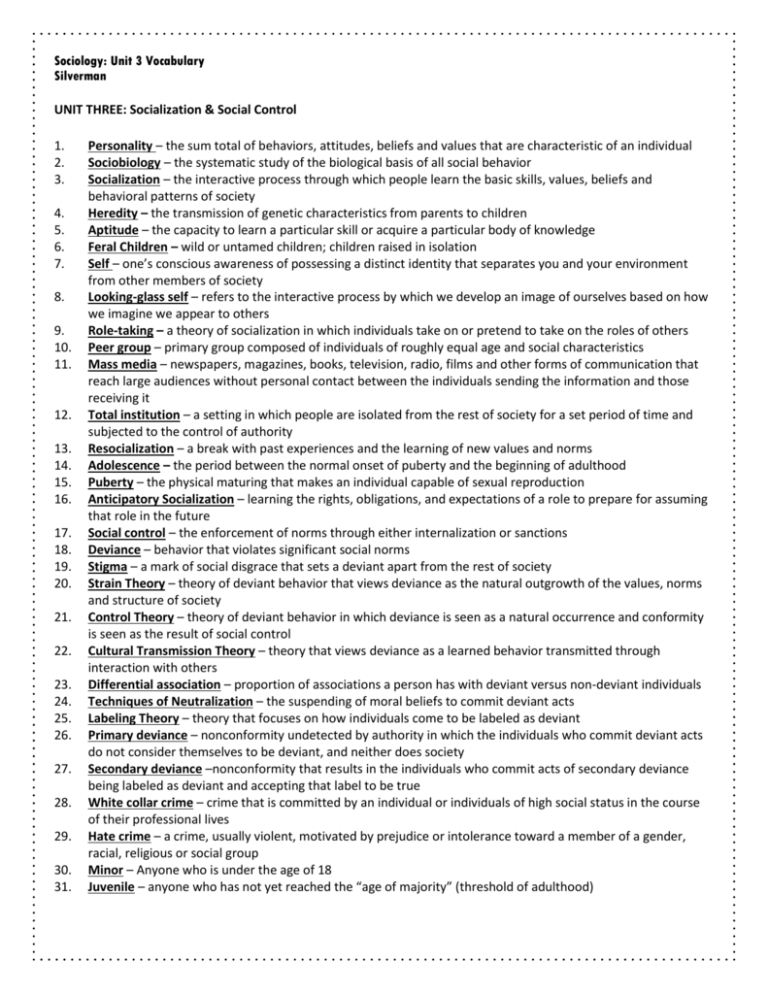
Sociology: Unit 3 Vocabulary Silverman UNIT THREE: Socialization & Social Control 1. 2. 3. 4. 5. 6. 7. 8. 9. 10. 11. 12. 13. 14. 15. 16. 17. 18. 19. 20. 21. 22. 23. 24. 25. 26. 27. 28. 29. 30. 31. Personality – the sum total of behaviors, attitudes, beliefs and values that are characteristic of an individual Sociobiology – the systematic study of the biological basis of all social behavior Socialization – the interactive process through which people learn the basic skills, values, beliefs and behavioral patterns of society Heredity – the transmission of genetic characteristics from parents to children Aptitude – the capacity to learn a particular skill or acquire a particular body of knowledge Feral Children – wild or untamed children; children raised in isolation Self – one’s conscious awareness of possessing a distinct identity that separates you and your environment from other members of society Looking-glass self – refers to the interactive process by which we develop an image of ourselves based on how we imagine we appear to others Role-taking – a theory of socialization in which individuals take on or pretend to take on the roles of others Peer group – primary group composed of individuals of roughly equal age and social characteristics Mass media – newspapers, magazines, books, television, radio, films and other forms of communication that reach large audiences without personal contact between the individuals sending the information and those receiving it Total institution – a setting in which people are isolated from the rest of society for a set period of time and subjected to the control of authority Resocialization – a break with past experiences and the learning of new values and norms Adolescence – the period between the normal onset of puberty and the beginning of adulthood Puberty – the physical maturing that makes an individual capable of sexual reproduction Anticipatory Socialization – learning the rights, obligations, and expectations of a role to prepare for assuming that role in the future Social control – the enforcement of norms through either internalization or sanctions Deviance – behavior that violates significant social norms Stigma – a mark of social disgrace that sets a deviant apart from the rest of society Strain Theory – theory of deviant behavior that views deviance as the natural outgrowth of the values, norms and structure of society Control Theory – theory of deviant behavior in which deviance is seen as a natural occurrence and conformity is seen as the result of social control Cultural Transmission Theory – theory that views deviance as a learned behavior transmitted through interaction with others Differential association – proportion of associations a person has with deviant versus non-deviant individuals Techniques of Neutralization – the suspending of moral beliefs to commit deviant acts Labeling Theory – theory that focuses on how individuals come to be labeled as deviant Primary deviance – nonconformity undetected by authority in which the individuals who commit deviant acts do not consider themselves to be deviant, and neither does society Secondary deviance –nonconformity that results in the individuals who commit acts of secondary deviance being labeled as deviant and accepting that label to be true White collar crime – crime that is committed by an individual or individuals of high social status in the course of their professional lives Hate crime – a crime, usually violent, motivated by prejudice or intolerance toward a member of a gender, racial, religious or social group Minor – Anyone who is under the age of 18 Juvenile – anyone who has not yet reached the “age of majority” (threshold of adulthood) UNIT THREE: ESSENTIAL QUESTIONS/STANDARDS Essential Question: How are humans socialized? What are the major sources of socialization and how do they help/hurt the socialization process? SSSocSC1: Students will explain the process of socialization. a. Identify and describes the roles and responsibilities of an individual in society. b. Analyze the individual development theories of Cooley and Mead. c. Identify and evaluate the stages of socialization; include childhood, adolescence, adulthood, and death/dying. d. Evaluate the factors that socialize the individual; include family, peers, education, media, and religion. e. Analyze how individuals are socialized by gender and race/ethnicity. Essential Question: What is deviance and what causes people to be deviant? SSSocSC2: Students will analyze deviance in society. a. Explain the socially constructed nature of deviance. b. Explain the relationship of social control and power in society. c. Analyze the causes of deviant behavior. d. Explain the impact of deviance on society. SSSocSC3: Students will analyze the impact of social control on deviance in society. a. Explain theories of social control; include control and labeling theories. b. Explain conformity in relationship to deviance and social control. c. Describe adaptation, cooperation, accommodation, and competition in the context of social control. Essential Question: How does society identify and deal with criminal behavior? SSSocSC4: Students will analyze the function of social institutions as agents of social control across differing societies and times. a. Analyze the function of social institutions in society; include family, education, religion, economy, government/politics, health care, and media. b. Evaluate the strengths and weaknesses of various social institutions. c. Evaluate other possible social institutions such as sports and science. d. Analyze the functions and inequalities of the criminal justice system in relationship to a society’s construct of crime and punishment. e. Explain the role of total institutions. f. Analyze the re-socialization process.
